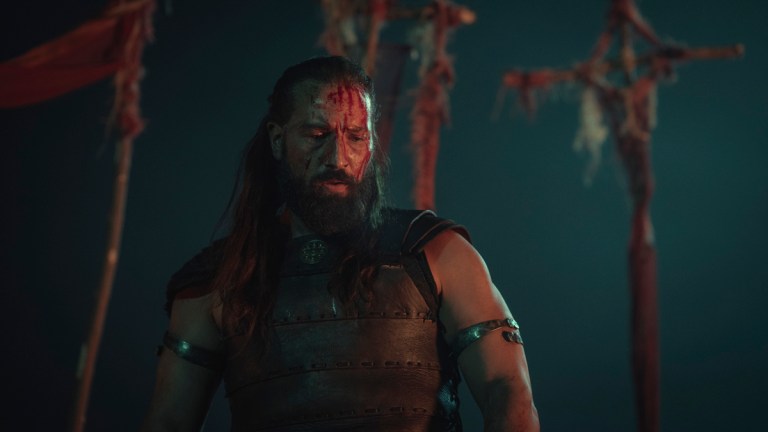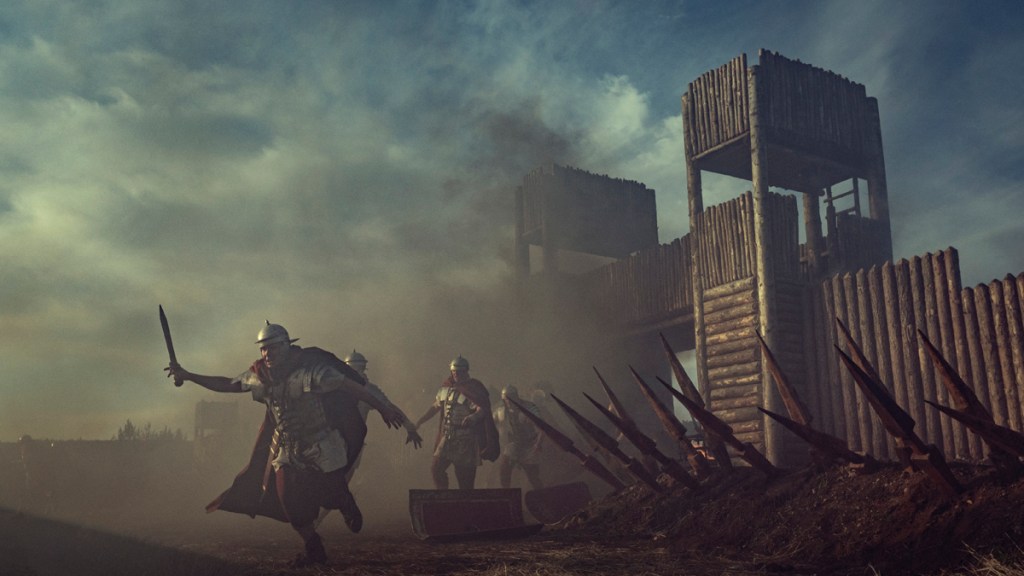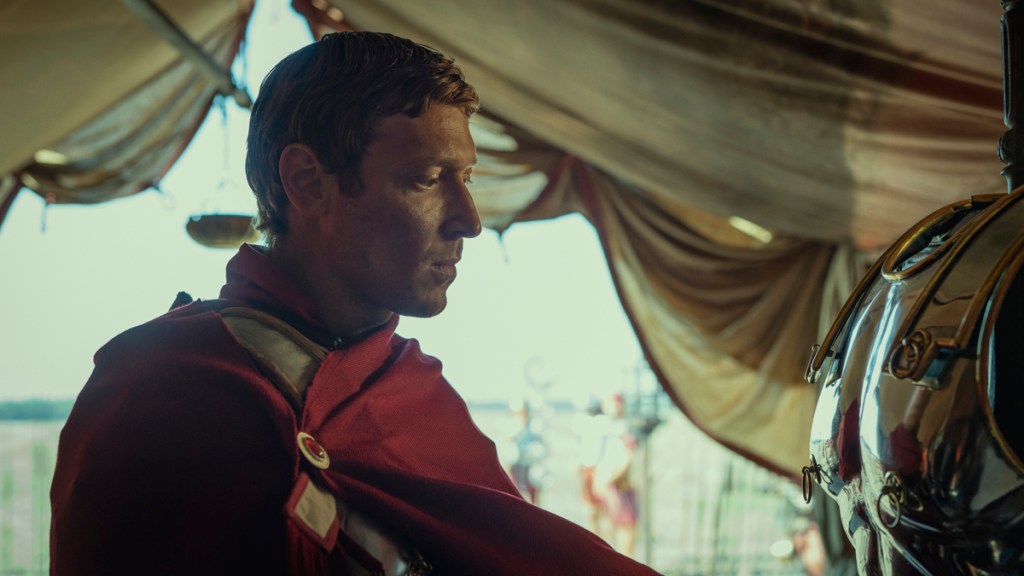Barbarians Season 2: Who Were The Real Marbod and Arminius?
Exploring the true stories behind hit German historical drama Barbarians, season 2 of which is out now on Netflix.

Warning: contains spoilers for Barbarians Season 2
In Netflix’s Barbarians, Arminius of the Cheroski and Marbod (or Maroboduus if you’re feeling adventurous) of the Macromanni are portrayed as frenemies bordering on enemies whose mutual respect and ill-treatment at the hands of the Romans force them into a working alliance. In reality, the two men had a more distant and hostile relationship. In their later years, long after the Romans had abandoned their expansionist ambitions in Germania, the two men fought each other with weary abandon, their dynastic dreams propelling their thirst for blood. But who exactly were these two men? What were they to each other? How accurate is their depiction in the series? And how did they live and die?
Arminius’s Tribute Act
The early lives of the real Arminius and Marbod followed similar trajectories, insofar as they were both Germanic princes ripped from their tribes and families as tributes to be raised and educated in Rome – a common tactic of the Romans when bringing native peoples to heel – only to return in adolescence to assume control of their respective clans. The show’s implication that the two men were aware of each other in Rome is almost certainly false, given that there was a significant age gap between them, and Marbod returned to Germania for good around the same time as Arminius was being taken away from his family (Marbod returned from Rome around 10BC; Arminius was born around 17BC). Though Marbod enjoyed the favour of the Emperor Augustus, his first move upon returning to his ancestral people was to move them as far from the sphere of Roman influence and attack as possible. He formed alliances with the neighbouring tribes, and proclaimed himself a King.
In season one of Barbarians, Arminius and his brother aren’t merely tributes, but the adopted sons of Publius Quinctilius Varus. While Varus understood that the boys were tools to ensure obedience from their tribe, and to secure long-term Roman interests in the region, he also felt a great measure of love and affection for them, and seemed to trust Arminius almost implicitly. In reality, it’s unlikely that Arminius and Varus, who’d served as a representative of the Emperor Augustus in the province of Syria, ever met prior to Arminius’s return to his Cheruski people in adulthood (in the show his people call him ‘Ari’, though his real name prior to Romanisation is unknown). This makes the real Arminius’s betrayal of Varus a much riskier gambit in retrospect, though he wouldn’t have suffered any Oedipal guilt like his fictional counterpart. Segestes, Thusnelda’s weasly father, was a real Cheruscan nobleman, and in real life, as in art, he did indeed try to scupper Arminius’s plans to ambush the Romans at Teutoburg Forest, but Varus repeatedly dismissed his claims.
While the show’s depiction of this iconic and world-shaking battle lasts less than the length of an episode, the real Battle of Teutoburg Forest raged for three or four days. The result was the same: nearly 20,000 Roman soldiers wiped out by an alliance of five of the near 50 native tribes that populated ancient Germania. Those soldiers comprised more than ten per cent of the entire imperial army. It’s also true that the real Varus committed suicide on the battlefield rather than submit to torture and mutilation at the hands of the horde.
So where was Marbod when all of this was happening?
Marbod Plays it Cool
While Marbod was being trained and educated in Rome, the Macromanni people were suffering terrible losses and humiliations at the hands of the Romans. That’s why the returning Marbod immediately moved his people into the area that would later be known as Bohemia, now nestled within the modern-day Czech Republic. It wasn’t enough. In 6AD, three years before the Battle of Teutoburg Forest, Augustus decreed that the Macromanni were a threat to Rome, and dispatched 12 legions under the command of Tiberius to destroy them (yes, future emperor Tiberius, who we see depicted in Barbarians‘ second season). Luck smiled upon Marbod in the form of the Revolt of Illyricum, a mass uprising against the Romans in the territories that fringed the Adriatic sea on the Balkan coast. This necessitated the diversion of many legions from Germania to contain the uprising, though the revolt soon upgraded itself to a war that raged on for four long years. The long-lasting reduction of manpower in the region doubtless made Arminius’s victory possible, too. Meanwhile, Marbod and the Macromanni were safe. From the Romans at least.
The sad subjugated past of the Macromanni and the extinction they dodged by a quirk of fate goes a long way towards explaining Marbod’s absence from the battle of Teutoburg Forest, and adds a whiff of verisimilitude to the pro-Rome pacifism of the fictional Marbod.
Roman historians record that Arminius sent Varus’s severed head to Marbod. Perhaps he did it to crow over his military prowess; perhaps it was an attempt to convince a fellow leader to join his righteous cause against their shared enemy. Whatever Arminius’s motivations, Marbod stayed true to form by having the head dispatched to Emperor Augustus. Feel free to make your own ‘Hed-Ex’ jokes.
The Empire Strikes Back
Years later, Germanicus fronted several campaigns to punish Arminius and his allies for their outrage at Teutoburg. Marbod remained steadfastly neutral throughout the conflicts. The Roman historian Tacitus cites Germanicus as telling his men that prisoners were needless: ‘nothing but the extermination of the race would end the war.’

Although Arminius’s forces suffered defeats, some at the hands of his own brother, Flavus – whose late side-switching and death in season two of Barbarians is thus historically inaccurate – the Romans were unable to lay claim to either Arminius’s head, or Germania itself. Tiberius, now Emperor, recalled Germanicus to Rome, on the grounds that the campaigns were costing more than they were benefiting, and perhaps fearing that Germanicus’s increasingly famed reputation would one day be a threat to his own power. Germanicus was, however, able to claim Arminius’s pregnant wife, Thusnelda, thanks again to her thoroughly awful father, Segestes. Thusnelda was taken to Rome, where Arminius’s son, Thumelicus, was born in semi-benign captivity. In the show, Thumelicus has already been born, and the abduction happens immediately after forces led by Marbod and Arminius have destroyed Tiberius’s encampment, thus repelling the Roman invasion fleet, an event that almost certainly never took place in real history. Little is known of Thusnelda’s life in Rome, or when and how she died, so we can expect a great deal of ahistorical surprises in season three, if it happens. We do know that Segestes didn’t have his head lopped off by Tiberius, or any other Roman leader, and lived long enough to watch his daughter being paraded through Rome like a trophy.
Arminius vs Marbod vs Death
Arminius’s status as a living legend helped him to poach many tribes that had hitherto shown fealty to Marbod. In turn, Marbod welcomed the defection of Arminius’s bitter and jealous uncle, Inguimerus, along with some of the Cheroski. It wasn’t long before tensions escalated into conflict. Arminius attacked first, scoring his only victory against Marbod at the Battle of the Hercynian Forest. In future conflicts, topography was Marbod’s friend, helping him to defend his territory against further incursion. Marbod even sent envoys to Rome requesting back-up. In the end it wasn’t Arminius who defeated Marbod, but one of his own aristocrats, who laid waste to the capital of Marobudum and deposed the Macromannic King. Marbod fled to Rome, where his pleas for shelter and assistance were met with immediate imprisonment in the city of Ravenna. There he remained for the rest of his life.
Arminius never lost his liberty, but he did eventually lose his life. Not to the Romans, but to his own people, who’d grown tired of his ceaseless efforts to subjugate the tribes and proclaim himself their King. In the end, it was Arminius’s own relatives who assassinated him, and it wasn’t impossible that his brother, Flavus, had something to do with it, given that Flavus’s son, Italicus, eventually became head of the Cheruski.
Depicting Marbod and Flavus’s Sexuality
Finally, let’s consider how some of the second season’s bolder narrative choices and departures from recorded history have met with controversy, and examine why those departures are so important in light of how that history has been framed in the long centuries since the events of Teutoburg Forest.

You’ve probably reasoned this already, but there is no historical evidence to suggest that Marbod ever met Flavus, or that Marbod was gay or bisexual. This latter point has opened the series to accusations of ‘wokery’ from certain portions of the right-leaning commentariat. We can only wonder if the people who hold such views have the same issues with the authenticity of the character of Folkwin. It doesn’t seem fair or logical to argue that we can populate pivotal moments in real-world history with invented people, but we dare not ascribe a non-heteronormative sexual preference to a real person from ancient history. After all, there isn’t any historical evidence to suggest that Marbod wasn’t gay or bisexual in real life, either.
Male homosexuality was a fact of life in Ancient Rome, though its manifestation tended to fall along lines of class, power and masculinity; i.e. those who were more the more dominant partner, both socially and sexually, suffered little loss of social standing for the act. Within the world of the show, it’s certainly conceivable that ‘when in Rome’, as the old saying goes, the physically-imposing and powerful Marbod would have gravitated to the more classically effeminate Flavus. What we really must ask ourselves is this: ‘Does the sexual relationship between Marbod and Flavus add something to the story?’ And the answer is yes. It adds depth, stakes, and complexity, to the characters as well as to the unfolding plot.
This isn’t the only area of the show where its creators have exercised their creative license. Folkwin’s wife, Dido, is a black woman of Carthaginian descent. The character of Thusnelda is shown as both a tribal power-player, and a warrior in her own right. You don’t have to search too far across the internet to find examples of opposition to these choices, many of them forceful. Again, we have no idea how common multi-racial relationships were in the ancient world, or how many European women fought alongside men on the battlefield in the centuries before the Viking shield-maidens, but absence of proof isn’t proof of absence. While weighing the accuracy of a work of historical fiction – especially one that’s set in a corner of the ancient world in which written records were scarce – you must ask yourself one thing, and one thing only: could this unlikely thing have happened in this place, in this era, even once? And if the answer is yes, then once is enough to justify its inclusion: provided it’s used sparingly enough to be at least reasonably proportionate to the time period.
There is, however, more at stake here than historical accuracy. Barbarians‘ showrunners, Jan Martin Scharf and Arne Nolting, have made it explicit in interviews that their interpretation of Arminius’s story – while striving to remain authentic in most important respects – constitutes a deliberate act of reclaiming that portion of proto-German history from the far-right. To understand what they mean by that, we have to look at the way Arminius’s legend has curdled over time.
The Meaning of Arminius
In the millennia following Arminius’s triumph he became a potent symbol of resistance and fortitude for first the Germanic people, and then, after 1871, the German people. A monument to his glory was commissioned in 1838, and completed in 1875, where it still stands today in the vicinity of Teutoburg Forest. Arminius’s statue perches high upon a sandstone base, gazing out across the tree-tops, his seven-metre long sword piercing the sky above him. As the new nation state of Germany advanced and evolved, Arminius came to represent and embody the nation’s sense of itself, especially in times of struggle.
Unfortunately, the rise of nationalism and national socialism between the wars saw Arminius co-opted as an instrument of Nazi propaganda. German school books came to depict Arminius as a blonde and blue-eyed Hercules; a hero who personified the Nazi ideal of the true-blooded German patriot. Hitler venerated his name. Arminius’s reputation was so sullied and mutated by this association with the Third Reich that after 1945 he was left twisting in the wind of history. People were no longer sure how to handle his legacy.

For this reason, the showrunners’ treatment of Arminius’s journey, and the whole fabric of the show, has been an act of conscious reclamation. As Arne Nolting told the New York Times, ‘We didn’t want to be scared away and leave the subject to those forces we detest.’ Even the casting of the dark-haired Austrian Lawrence Rupp was a deliberate move to distance their Arminius from the Nazified version of him that was promulgated in the 1930s and beyond. Note, also, Arminius’s urgent rhetoric in the show’s first season about the Romans and their savage need to dominate, convert and destroy people who don’t look, think and live as they do. It isn’t hard to read between those lines.
Simply put, those who find themselves objecting to the mild inclusion of egalitarianism, homosexuality, black people, and women with agency in Barbarians‘ narrative, should perhaps consider the calibre of tribe with which their views ally them. Barbarians is based on history, but it isn’t a documentary. It’s entertainment, first and foremost. And, if you can forgive this article ending on a Russell Crowe-ism: are you not entertained?
Barbarians Season 2 is out now on Netflix.
